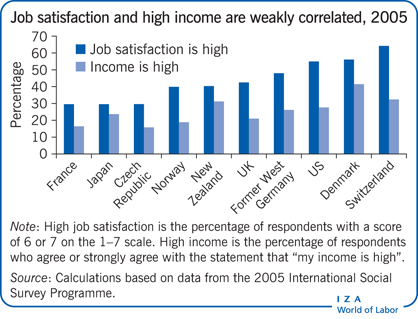Elevator pitch
Many measures of job satisfaction have been trending downward. Because jobs are a key part of most people’s lives, knowing what makes a good job (job quality) is vital to knowing how well society is doing. Integral to worker well-being, job quality also affects the labor market through related decisions on whether to work, whether to quit, and how much effort to put into a job. Empirical work on what constitutes a good job finds that workers value more than wages; they also value job security and interest in their work. Policy to affect job quality requires information on the cost of the different aspects of job quality and how much workers value them.

Key findings
Pros
Job quality is important to individual well-being.
Job quality can have positive returns for firms, as workers reciprocate through greater effort, retention, and engagement.
How workers value job domains seems to be stable over time, and workers appear to match to jobs that accord with their values.
Job satisfaction can reflect the distribution of job quality.
Lack of information, distortionary taxes, or an imbalance of bargaining power between workers and firms may prevent labor markets from providing the optimal level of job quality on their own.
Cons
Many measures of job satisfaction have been trending downward in OECD countries.
Most aspects of job quality are costly for firms.
Information on all the job outcomes that matter for workers, and how important they are, remains sketchy.
Job outcomes often change in different directions over time, which must be considered when assessing how overall job quality has changed.
Policy interventions require information on such job domains as hours, promotions, security, and work conditions (to show how job quality can be changed). Such information remains unclear.